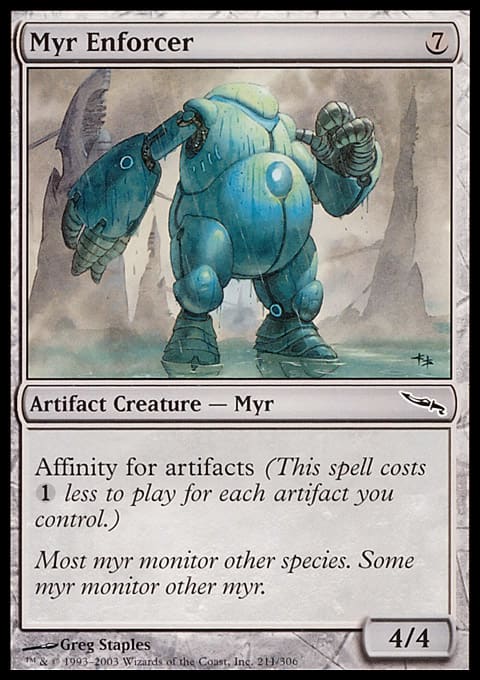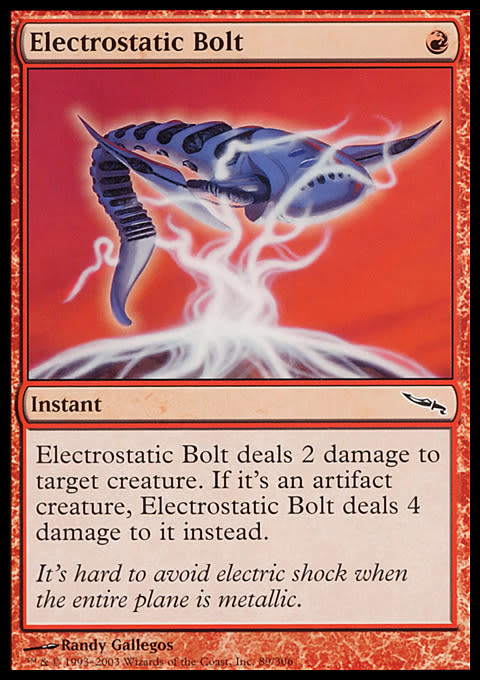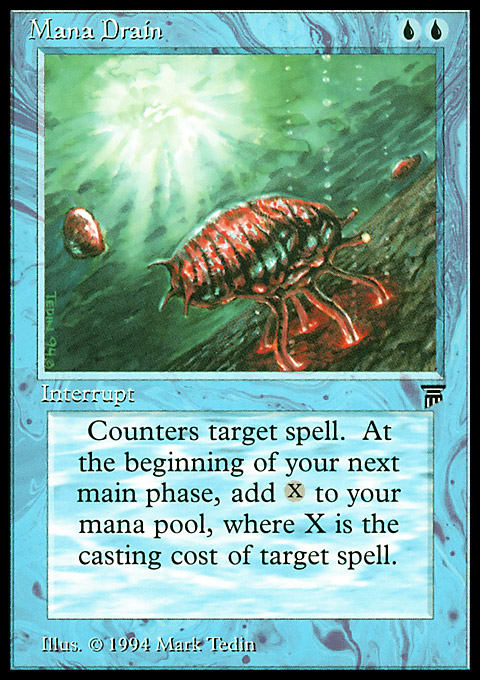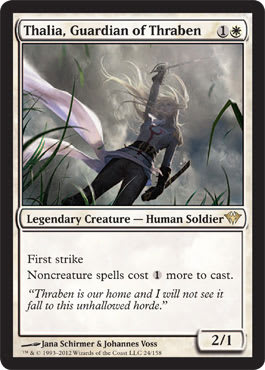This take is stone cold insofar it's set in stone. In Magic, free spells are good, busted even. We've heard Evan Erwin say it often enough on Magic Mics. We've hammered out plenty of free spells with Fires of Invention. Even if we've never played it, we've heard of the supremely powerful Force of Will.
Players understand that free spells are good, but they're not just good. They're great. Some people thought Once Upon a Time wasn't an automatic four-of in Standard. This article points out some of the fallacies that trick players into thinking they can do better than free. I'll illustrate points from a few formats, including my current obsession of Oathbreaker. Yes, we think we know the power of free spells, but it bears repeating, and they're stronger than even we think.
Don't be fooled by the seven in the upper right corner of Myr Enforcer. In the worst days of Affinity, this spell was free. You would often see this card turn two or even turn one, sometimes in multiples. Imagine a more consistent Hollow One. Given this power (and the title of this article) you may well imagine Myr Enforcer and other artifacts dominated, and they did. What was noteworthy is how some players thought they could beat them. I'm embarrassed to say I was one of them.
You see, I looked at Electrostatic Bolt and thought I had the answer. Even pros were fooled. Their game plane was to Detonate the Affinity player's artifact lands, to keep them off their payoffs like Myr Enforcer. Blowing up a land for ![]() was a dream come true for Stone Rain lovers, but largely speaking, it didn't win games, and not only because the answers didn't always line up against threats.
was a dream come true for Stone Rain lovers, but largely speaking, it didn't win games, and not only because the answers didn't always line up against threats.
Casting Electrostatic Bolt on Myr Enforcer felt great. I always wanted to destroy a 4/4 creature for one mana. You thought Lightning Bolt was fun? And I could cast Echoing Ruin, in theory, killing two Myr Enforcers at once for card advantage. In my mind, I was winning. I just couldn't wrap my head around why I kept losing.
Independent of how it felt, killing Myr Enforcer with Electrostatic Bolt was bad. At the time, I didn't appreciate how much more the one mana I spent on the kill spell was compared to the zero mana the Affinity player needed to cast it, or what that meant for the game. Every time I tapped a Mountain to clear a threat that cost 0, I fell behind. Not only did they have 4/4's in play but also often a stray Frogmite and, even scarier, Welding Jar. My highly efficient kill spells were still losing me tempo.
More recently versus Modern Affinity, casting Lightning Bolt on Ornithopter feels terrible. You're losing tempo, bleeding life points as your opponent deploys more threats faster than you can answer. Over multiple turns this advantage in mana efficiency escalates into decisive wins, unless you can turn it around with a sweeper, gaining back that tempo by killing creatures your opponent spent more resources to deploy. That's what some pros tried to do back in the day with Furnace Dragon. Again, it was wrong.
Once you understand a format is being won by the tempo advantage of inexpensive or free spells, adapt your card evaluations. The correct decision would have been to put away my Electrostatic Bolt and Detonate cards. If I had been as good a player as Zvi Mowshowitz, I would've instead searched for ways to deploy artifacts even faster, with Aether Vial.
The tempo granted by free spells is often enough to warp an entire format. In such cases, the limiting factor is often not mana but cards in hand. Think of Legacy, where Force of Will is a staple to check combo. The true cost of Force of Will is in its card disadvantage, and Blue players will often side it out if they know their foe is playing fair.
In the casual singleton format of Oathbreaker, not only is Force of Will legal but Mana Drain is too. The latter belongs in this conversation because if you counter a 2-drop with it, you will recoup the two mana you spent on your next turn. Now, you may not always be able to use that mana, but if you do, Mana Drain has a tempo cost of zero. It may have even netted you mana, if you snag a spell with a converted mana cost of three or more.
Allow me to explain a few more details about this format. Unlike Commander, you play with fifty-eight card decks while a Planeswalker and signature spell in the command zone. This means you're more likely to see individual cards, such as Force of Will. Also, because you start with two cards face up, you effectively have a starting hand of nine, meaning the card disadvantage of Force of Will is less important. In Oathbreaker, pitch free spells are at their strongest.
Likewise, Force of Negation would be at a premium. But remember, Mana Drain is legal too. We can't risk our opponents resolving that against us, so we'll also include Spell Pierce and Swan Song, alongside Mental Misstep to clear those counters on the other side of the table along with pesky hate like Pyroblast. Oh, and we might just toss in Fierce Guardianship and Pact of Negation. The latter is at its best if we're combo winning that turn.
We have a format where Blue has multiple counters that have an average mana cost of less than ![]() . Now, since this is casual, we can self-select a playgroup that doesn't compete at this power level, but for the sake of argument, let's examine what all these inexpensive counters do to a meta and how they change card evaluations.
. Now, since this is casual, we can self-select a playgroup that doesn't compete at this power level, but for the sake of argument, let's examine what all these inexpensive counters do to a meta and how they change card evaluations.
First of all, you can forget playing a non-Blue combo deck. No amount of Veil of Summer or Pyroblast is going to protect your key spells. While this hate may feel good, in theory, they cost more than the average Blue spell they're trying to foil. Some of the fast mana in other colors, such as Dark Ritual, has been banned, so there's no gaining a tempo advantage there. Cabal Therapy is always tempo negative. Allosaurus Shepherd will work, as will a handful of other cards. The problem is they're fewer in number than the wealth of inexpensive counters. Searching for them takes time, which you don't have.
Because Blue has the most efficient answers, it can also execute the most aggressive game plan. Not only does it have the opportunity to play combo, it can also put its combo pieces in the command zone. With a dependable kill condition face up, it fills the rest of its deck with those inexpensive answers and mana acceleration. Turn two, you can cast Arcane Signet, and with that single ![]() you can threaten Spell Pierce (for your opponent's noncreature spells in the command zone) or Unsummon (should they get frisky with a hate bear).
you can threaten Spell Pierce (for your opponent's noncreature spells in the command zone) or Unsummon (should they get frisky with a hate bear).
If a non-Blue deck tries a similar lean strategy, with its kill conditions in the command zone, it will not work. Take the potent card Jeska's Will. This may seem like a great turn-three play, after Tibalt, the Fiend-Blooded, but you cannot depend on it in the same way a Blue deck can count on their win conditions. They can counter your Jeska's Will at a tempo advantage, and if you try to force it through with Red Elemental Blast, you're further delaying yourself. And as the turn clock clicks further and your opponents cast more cards from their opening seven, the strength of Jeska's Will plummets.
I've found that it's better to fight this meta with decks full of individually powerful cards, so it's harder for Blue mages to poke a hole in your strategy, and cheaper cards, so they don't get as large a tempo advantage off counterspelling you. We can't compete with the mana efficiency of their answers, but we might be able to get under their win conditions or disrupt their artifact accelerants.
By Force is flexible and can potentially give you card advantage. But after reading this article I hope you'll see that the stronger card is Mogg Salvage. As Jaya Ballard says, fight fire with fire. Fight free with free. And I hope you understand that Tibalt, the Fiend-Blooded may be a better card in your command zone than Chandra, Torch of Defiance, for reasons of tempo. Can you imagine getting your 4-drop commander countered with Mana Drain?
Another way you can win is by running your opponent out of counters, but since they're accelerating so fast to their win, you won't get too many chances. You can hope their answers don't line up with your lock pieces. If they have Spell Pierce and not Unsummon, your hate bear might set you on a winning trajectory.
By understanding the true power of free and inexpensive cards, we will be better equipped to evaluate our options and build winning strategies. And don't forget, the best strategy is often to play those meta-warping free spells yourself.
Priced to Move | Oathbreaker | AE Marling
- Command zone (2)
- 1 Jace, Wielder of Mysteries
- 1 Paradigm Shift
- Instants (17)
- 1 Fierce Guardianship
- 1 Flusterstorm
- 1 Force of Negation
- 1 Force of Will
- 1 Gush
- 1 Mana Drain
- 1 Mental Misstep
- 1 Pact of Negation
- 1 Pongify
- 1 Rapid Hybridization
- 1 Remand
- 1 Snapback
- 1 Spell Pierce
- 1 Stern Dismissal
- 1 Swan Song
- 1 Unsummon
- 1 Wipe Away
- Sorceries (4)
- 1 Gitaxian Probe
- 1 Leyline of Anticipation
- 1 Mystic Remora
- 1 Thought Lash






























